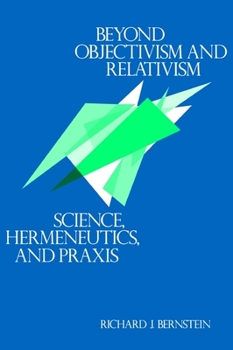Beyond Objectivism and Relativism: Science, Hermeneutics, and PRAXIS
Select Format
Select Condition 
Book Overview
Drawing freely and expertly from Continental and analytic traditions, Richard Bernstein examines a number of debates and controversies exemplified in the works of Gadamer, Habermas, Rorty, and Arendt. He argues that a "new conversation" is emerging about human rationality--a new understanding that emphasizes its practical character and has important ramifications both for thought and action.
Format:Paperback
Language:English
ISBN:0812211650
ISBN13:9780812211658
Release Date:November 1983
Publisher:University of Pennsylvania Press
Length:320 Pages
Weight:0.05 lbs.
Dimensions:0.4" x 6.0" x 9.0"
Customer Reviews
4 ratings
Probing
Published by Thriftbooks.com User , 21 years ago
Equipped with a synoptic point of view, Bernstein has long worked the difficult terrain between continental philosophy and its more positivist Anglo-American counterpart. Here he traces what he believes is a key movement away from the broad modern tradition characterized by Descartes and the perennial search for philosophical foundations. Not always self-consciously, this emerging movement (Gadamer, Rorty, et. al.) rejects the Cartesian search for absolutes as ultimately futile; yet refuses to accept relativism as the only remaining recourse. The book's burden is to show how a viable `third way' is in fact emerging from the overlaps in the movement. His discussion is stimulating, ranging from Aristotle to Kuhn to Habermas, Kant and Arendt. No doubt he has put his finger on an acutely felt issue of our skeptical age, one that lurks ubiquitously in the background of more narrowly framed topics. Yet, how effectively this third way manages to extricate itself from the either-or of objectivism vs. relativism is up to the individual reader to judge. Frankly, I was disappointed, feeling that the results were unduly vague and pointing in the direction of a sophisticated brand of sociological relativism. Be that as it may, the text includes not a single mention of post-modernism, which may date the work in the eyes of some. Still, the meta-philosophical issue Bernstein addresses can be discussed quite apart from those specific to post-moderns and their recourse to outright relativism. As always, Bernstein remains an important interpreter of international trends and is well worth the read.
Toward a Deeper Understanding of Understanding
Published by Thriftbooks.com User , 21 years ago
Richard Bernstein is one of the most balanced and deeply thoughtful Americans doing philosophy today. Thoroughly at home in several different schools of contemporary thought, he writes with exceptional clarity and generosity of spirit. This book is one of his most important. At a time when most Americans seem convinced that objectivism and relativism are our only options and that if objectivism is ultimately incoherent nothing remains but a relativism that ultimately makes conversation impossible, this book can be a life-saver! Respectful of what the physical and life sciences can do and contribute, Bernstein makes clear the limits of their methods and the reasonableness of turning to alternative ways of knowing and thinking for other realms of meaning, value, and reality. A careful reading of this book could save everybody years of wandering up and down blind alleys. This is philosophy written to communicate with others and to be helpful, rather than to inflate the author's ego and display sophistication. It can change the way you inhabit the world and put your feet on a path that takes you in the direction of hope and solidarity.
persuasive enough!
Published by Thriftbooks.com User , 21 years ago
A perfect one-sided story carefully equipped with opinions of heavy-weighted thinkers elaborately designed to persuade, but one-sided nevertheless.
Required reading for contemporary philosophy!
Published by Thriftbooks.com User , 25 years ago
Are we the measure of the all things or is truth independent of our beliefs and wishes? Bernstein begins tackling this question by observing that the real debate is not between absolutism and relativism but between...(well, read the title!) He claims that while few (philosophers anyway) believe that truth is eternal, many at least believe that it is not merely about our own subjectivity. But the real question for Bernstein is Why all the fuss? Is there a certain tone of anxiety present in the discussion? Bernstein says that indeed there is and it's due to conflicts in concern between the need to believe in a stable reality and the fear that rheified cultural schemes can become the basis of intellectual and social tyrany- Bernstein calls this a "pracical-moral concern" and manages to discuss it without presuming that there are no serious theoretical issues involved. I'm an absolutist myself (what a philosophical dinosaur I am!) and I found this book so enthralling that I engaged in frquent, feverish marginal annotating (and in my schools, you didn't buy the texts so you DID NOT mark them up). Whatever your philosophical persuasion, this book should bring some illumination along with many happy moments of reading. At this price, it's a bargain. GET IT!





